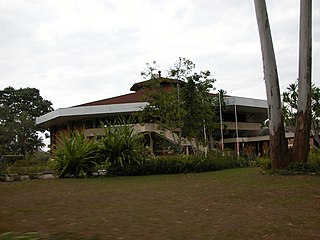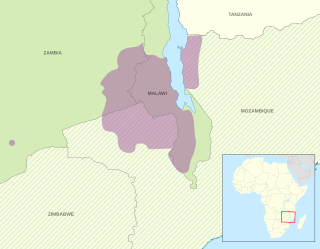Related Research Articles

Zomba is a city in southern Malawi, in the Shire Highlands. It is the former capital city of Malawi.

Chewa is a Bantu language spoken in Malawi and a recognised minority in Zambia and Mozambique. The noun class prefix chi- is used for languages, so the language is usually called Chichewa and Chinyanja. In Malawi, the name was officially changed from Chinyanja to Chichewa in 1968 at the insistence of President Hastings Kamuzu Banda, and this is still the name most commonly used in Malawi today. In Zambia, the language is generally known as Nyanja or Cinyanja/Chinyanja '(language) of the lake'.

The University of Malawi (UNIMA) is a public university established in 1965 and until 4 May 2021, when the university underwent a delinking, was composed of four constituent colleges located in Zomba, Blantyre, and Lilongwe. Of the four colleges, the largest is Chancellor College in Zomba. It is part of the Malawian government educational system. The last Vice-Chancellor was Professor John Kalenga Saka. UNIMA celebrated its golden jubilee from the 24 to the 26 September 2015.
Jack Mapanje is a Malawian writer and poet. He was the head of English at the Chancellor College, the main campus of the University of Malawi before being imprisoned in 1987 for his collection Of Chameleons and Gods, which indirectly criticized the administration of President Hastings Banda. He was released in 1991 and emigrated to the UK, where he worked as a teacher.
David Rubadiri was a Malawian diplomat, academic and poet, playwright and novelist. Rubadiri is ranked as one of Africa's most widely anthologized and celebrated poets to emerge after independence.
Stanley Onjezani Kenani is a Malawian writer of poetry and short stories. He has performed at the Arts Alive Festival in Johannesburg, South Africa, Poetry Africa in Durban, South Africa, Harare International Festival of the Arts (HIFA) in Harare, Zimbabwe, and at the Struga Poetry Evenings in North Macedonia. He has read with several famous African and world poets, including Mahmoud Darwish of Palestine, Natalie Handal of Palestine/USA, Carolyn Forche of USA, Dennis Brutus of South Africa, Keorapetse Kgositsile of South Africa, Shimmer Chinodya of Zimbabwe, Chirikure Chirikure of Zimbabwe, Benedicto Wokomaatani Malunga of Malawi and Alfred Msadala of Malawi among others.
John Dustan Msonthi was a Malawian politician. He served as a Cabinet Minister and translator during the government of Kamuzu Banda.
Steve Bernard Miles Chimombo was a Malawian writer, poet, editor and teacher. He was born in Zomba.

Tonga is a Bantu language spoken mainly in the Nkhata Bay District of Malawi. The number of speakers is estimated to be 170,000. According to the Mdawuku wa Atonga (MWATO) there are also significant numbers of speakers living elsewhere in Malawi and in neighbouring countries.
Chichewa is the main language spoken in south and central Malawi, and to a lesser extent in Zambia, Mozambique and Zimbabwe. Like most other Bantu languages, it is tonal; that is to say, pitch patterns are an important part of the pronunciation of words. Thus, for example, the word chímanga (high-low-low) 'maize' can be distinguished from chinangwá (low-low-high) 'cassava' not only by its consonants but also by its pitch pattern. These patterns remain constant in whatever context the nouns are used.
Innocent Masina Nkhonyo is a Malawian writer and poet, writing mostly in the Chichewa language. He was born in Dedza, and educated at Likuni Primary School and Mlale Seminary in Lilongwe. From 2008 to 2012 he studied Education Humanities at the University of Malawi in Zomba. He has had numerous short stories in Chichewa published in the newspapers Weekend Nation and Malawi News. He has also written poems, including Mubwere ku Mudzi and Mseko ('Laughter').
Ezra Jofiya Chadza (1923-1985) or E.J. Chadza, as he signed his books, was a well-known Malawian teacher, author and poet, writing especially in the Chichewa language of Malawi.

Professor Francis P. B. Moto is a Malawian writer, academic, and diplomat. His home is Golomoti in the Dedza District of Malawi. He attended secondary school in Chichiri in Blantyre and was admitted to the University of Malawi in 1972, obtaining a degree in linguistics in 1977.
Chichewa is the main lingua franca of central and southern Malawi and neighbouring regions. Like other Bantu languages it has a wide range of tenses. In terms of time, Chichewa tenses can be divided into present, recent past, remote past, near future, and remote future. The dividing line between near and remote tenses is not exact, however. Remote tenses cannot be used of events of today, but near tenses can be used of events earlier or later than today.
Willie T. Zingani is a Malawian novelist, poet, playwright and journalist.
Boston Jaston Soko is a professor at Mzuzu University in the French section of the Faculty of Education's department of Languages and Literature. He has taught in several universities on French language and literature. He has written for over four decades on African literature in French language as well as in English. Prof. Soko is also a chairperson of the Ngoni cultural heritage association known as Mzimba Heritage Association. He coined the name for the Ngoni Cultural Festival which is called "uMthetho". The name was approved by the Executive and His Majesty Inkosi ya Makosi M'mbelwa IV in 2004. Professor Soko's work is much praised and appreciated for contributing to the promotion of the French language in the Republic of Malawi as well as promoting Malawian literature. He "has been very active in research in African Literatures, teaching the African novel of French expression, negritude poetry, and oral literature".
Didier Njirayamanda Kaphagawani or Didier Kaphagawani was a Malawian philosopher. He is known for his ideas on African philosophy. This included ideas on African epistemology and African understandings of personhood.
Alfred (“Al”) D. Mtenje is a professor of Linguistics at the University of Malawi. He is known for his work on the prosody of Malawian Bantu languages, as well as for his work in support of language policies promoting the native languages of Malawi.
References
- ↑ WorldCat Identities
- ↑ http://www.nyasatimes.com 24 April 2011; Galilee International Management Institute website 12 July 2015 Archived 2015-10-12 at the Wayback Machine
- 1 2 Malunga, Ndidzakutengera ku Nyanja, author information.
- ↑ Interview with Stanley Kenani